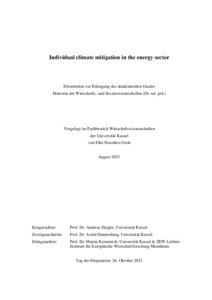| dc.date.accessioned | 2022-03-09T09:18:31Z | |
| dc.date.issued | 2021 | |
| dc.identifier | doi:10.17170/kobra-202203025817 | |
| dc.identifier.uri | http://hdl.handle.net/123456789/13683 | |
| dc.description.sponsorship | This work was financially supported by the German Federal Ministry of Education and Research [grant numbers: 01UN1204B, 01UN1220B, 01LA1813A ]. | eng |
| dc.language.iso | eng | eng |
| dc.relation.haspart | doi:10.1016/j.enpol.2019.111171 | |
| dc.relation.haspart | doi:10.1080/14693062.2020.1864269 | |
| dc.relation.haspart | doi:10.1016/j.ecolecon.2021.107264 | |
| dc.rights | Urheberrechtlich geschützt | |
| dc.rights.uri | https://rightsstatements.org/page/InC/1.0/ | |
| dc.subject | Identität | ger |
| dc.subject | Ökonomische Präferenzen | ger |
| dc.subject | Mikroökonometrie | ger |
| dc.subject | Energieökonomik | ger |
| dc.subject | Klimaschutz | ger |
| dc.subject | Verhaltensökonomik | ger |
| dc.subject.ddc | 330 | |
| dc.title | Individual climate mitigation in the energy sector | ger |
| dc.type | Dissertation | |
| dcterms.abstract | Based on micro-econometric analyses of survey data, this thesis extends existing research on the determinants of climate-friendly behavior in the energy sector with a special focus on economic preferences and social identity. It contains an overarching introduction and conclusion including a discussion of the policy implications of the results and avenues for future research. The main body of the thesis contains six research articles, organized in two subsections containing three articles each. All six research articles are self-contained and can be read autonomously.
The first subsection focuses on the support of energy policies and thus socio-political acceptance. The first article provides empirical evidence that the expansion of renewable energies is perceived as a climate policy measure by the public. It also shows that the support of the energy transition is mainly determined by political identity and that economic preferences are only relevant with respect to very specific topics. The second article further examines the trade-off between environmental and social sustainability in energy policy and shows that preferences for environmental sustainability are mainly driven by political identity, whereas preferences for social sustainability are mainly determined by social preferences. The third article examines the influence of the COVID-19 pandemic on climate and energy policy support and shows that concerns on the personal economic situation due to the anti-corona measures reduce the support of some of the considered policies. Nevertheless, identity is the driving force of policy support even in times of crisis.
The second subsection of this thesis focuses on individual behavior on the electricity market and thus market acceptance. The first article provides empirical evidence that electricity consumption is not considered as a climate-friendly behavior in Germany. Instead, it shows that electricity consumption is mainly determined by individual and household characteristics, but also by political identity and patience. The second article provides evidence that the choice of electricity contracts with renewable energy mixes is causally affected by environmental identity. It also shows that corresponding priming effects are non-linear. The third article provides empirical evidence for a positive willingness to pay for regionally produced electricity as another dimension of sustainable energy production. It additionally shows that regional identity negatively affects preferences for regionally produced electricity.
This thesis clarifies that the social acceptance of climate change mitigation in the energy sector is generally high in Germany. However, social and individual consequences need to be considered to sustain social acceptance. Economic preferences and social identity are both related to certain energy-related behaviors, whereby identity seems to have a stronger influence in total. The two priming studies provide evidence that the effect of identity is causal at least in the case of electricity contract choice. Due to the significant relationship between trust and socio-political acceptance as well as between patience and electricity consumption, economic preferences are an important channel to trigger climate change mitigation in the energy sector, at least in the short run. Nevertheless, value shaping and identity building seem to be key to motivate individual climate change mitigation in the energy sector in the long run. | eng |
| dcterms.accessRights | open access | |
| dcterms.creator | Groh, Elke Dorothea | |
| dcterms.dateAccepted | 2021-10-26 | |
| dcterms.extent | X, 196, XI-XXXIX Seiten | |
| dc.contributor.corporatename | Kassel, Universität Kassel, Fachbereich Wirtschaftswissenschaften | |
| dc.contributor.referee | Ziegler, Andreas (Prof. Dr.) | |
| dc.contributor.referee | Dannenberg, Astrid (Prof. Dr.) | |
| dc.contributor.referee | Kesternich, Martin (Prof. Dr.) | |
| dc.relation.projectid | 01UN1204B; 01UN1220B; 01LA1813A | |
| dc.subject.swd | Identität | ger |
| dc.subject.swd | Präferenz | ger |
| dc.subject.swd | Politische Ökonomie | ger |
| dc.subject.swd | Mikroökonomisches Modell | ger |
| dc.subject.swd | Energiewirtschaft | ger |
| dc.subject.swd | Klimaschutz | ger |
| dc.subject.swd | Verhaltensökonomie | ger |
| dc.type.version | publishedVersion | |
| ubks.embargo.terms | 2023-10-26 | |
| ubks.embargo.end | 2023-10-26 | |
| kup.iskup | false | |
| ubks.epflicht | true | |
| ubks.kumDiss | true | |

